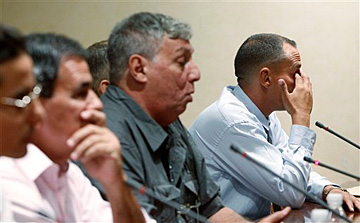
|  |  |  Editorials | Issues Editorials | Issues  
Cuba Releases Prisoners, Will U.S. Reciprocate?
 Emile Schepers - peoplesworld.org Emile Schepers - peoplesworld.org
go to original
July 17, 2010


| | Cuban prisoners who were released from jail in Cuba and flown to Spain, at a July 15 news conference in Madrid. (AP/Paul White) |  |
Last week, the Cuban government first announced and then began the process of releasing 52 individuals who had been in prison since a 2003 crackdown on people who received money from U.S. government and private funds aimed at destabilizing the 51-year-old socialist government. It now remains to be seen whether, or how, the United States might respond with a reciprocal gesture that could begin to thaw the long-frozen relations between the two governments.

The release of the prisoners was negotiated with the Roman Catholic Church and the Spanish government. The 52 individuals had been arrested and convicted when Cuban undercover agents presented evidence in court that those involved had received money and other material considerations to further their work against the socialist government. In the U.S. and international corporate media, they have been portrayed as "dissidents" whose only crime was to express disagreement with the Cuban government. The Cuban government, for its part, points out that merely dissenting does not get you hard time; these people violated a specific Cuban law which prohibits Cuban citizens from taking money from specific U.S. agencies whose purpose is openly stated to be the destabilization of Cuba.

The original number of people convicted in the case was 75, but since 2003 some have been released for health and other reasons. Of the group of 52 whose release was promised last week, some, but not all, are expected to emigrate to Spain and other countries. Last week, an initial group of seven arrived in Spain.

In response to the release announcement, Cuban dissident Guillermo Fariñas announced the end of a 134-day hunger strike which had become life-threatening.

Now Cuba-watchers of all political persuasions are waiting to see what the Obama administration will do. Since Obama was elected, Cuban President Raul Castro has been broadly hinting that his government would be willing to negotiate reciprocal exchanges of prisoners, meaning Cuban "dissidents" versus the Miami Five (also known internationally as the Cuban Five), as a first step in the direction of thawing U.S.-Cuban relations.

The initial response by Secretary of State Hillary Clinton was to characterize the release announcement as a positive step. However, in a talk to Jewish groups last week, Clinton added to the mix the case of Alan Gross, a U.S. citizen under arrest in Cuba for actions similar to those of the 2003 arrestees.

Gross was arrested as he was leaving Cuba in December 2009. Although he has not yet been formally charged, the offense of which the Cubans suspect him was that of acting as a courier for a U.S. State Department contractor, Development Alternatives Inc., bringing in sophisticated electronic equipment which the island's government suspects was designed to help internal destabilization efforts. The suspicions are partly grounded in the surreptitious way that Gross was working, but also in the fact that the money that was paying for his work appears to have come from funds allocated to support dissident groups in Cuba to destabilize the government.

Gross claims he was merely trying to help Jewish groups in Cuba with basic communications equipment, but there are problems with that story: He entered Cuba on a tourist visa without coordinating his visit with Cuban authorities, and some major Jewish leaders in Cuba say they have never heard of him. To do what the Cuban government accuses Gross of doing would be a violation of specific Cuban laws, and would entail a jail sentence of three to eight years. However, he has not yet been charged.

At any rate, Secretary of State Clinton called for Jewish organizations in the U.S. to pressure the Cuban government to release Gross.

The U.S. corporate-controlled media are, as one might expect, doing their best to muddle the situation. For example, a hunger striker who died in February of this year, Orlando Zapata Tamayo, is regularly portrayed as having been imprisoned for dissident activities, but in fact he was imprisoned for hitting a fellow citizen over the head with a machete and similar actions, and only became a "dissident" once in prison. On the other hand, hunger striker Fariñas was portrayed as a prisoner; in fact he is not in prison and has been carrying out his hunger strike at his home. Now Gross is being depicted as a victim of Cuban anti-Semitic persecution.

The media "forget to mention" that in the United States, anybody who distributed or accepted money or other material resources from the Cuban government without U.S. government permission would also be subjected to fines and possible jail terms. |

 |
|  |



